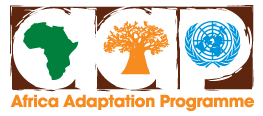The Africa Adaptation Programme (AAP) held a conference in Dakar, Senegal, marking the end of its four-year mandate.
The conference reviewed review lessons learned, deliverables and sustainability of the programme.
Participants called for a bridging strategy to support initiatives building on AAP outcomes, including National Adaptation Plans (NAPs) to be prepared under the UN Framework Convention on Climate Change (UNFCCC), and Green Economy Low-Carbon Emission Policy Frameworks.
 22 November 2012: The Africa Adaptation Programme (AAP) has released a summary report of the regional conference marking the end of its four-year mandate, outlining lessons learned from the programme, its deliverables and its sustainability potential.
22 November 2012: The Africa Adaptation Programme (AAP) has released a summary report of the regional conference marking the end of its four-year mandate, outlining lessons learned from the programme, its deliverables and its sustainability potential.
Over 100 participants took part in the AAP Final Country Conference, which took place in Dakar, Senegal, from 12-16 November 2012. Participants stressed the need for the investment of previous years to be protected by a bridging strategy, and funds to enable country teams to complete outstanding tasks as well as support the preparation of future initiatives building on AAP outcomes. These include National Adaptation Plans (NAPs) to be prepared under the UN Framework Convention on Climate Change (UNFCCC), and Green Economy Low-Carbon Emission Policy Frameworks.
The summary report notes slow delivery due to lack of technical capabilities in the first two years, followed by rapid progress in 2012. Among the lessons learned is the need for: ensuring high-level leadership and commitment from governments, including the services of a “champion” who is able to direct the work of government agencies; increasing the engagement with country stakeholders during the design phase; limiting the number and difficulty of projects to be in keeping with existing country capacity; and specifying the mandate of Steering Committees, along with clear definition of individual roles and responsibilities, and a regular schedule of meetings.
The report specifically highlights lessons learned in the area of knowledge management and the use of data to inform policy making, and commends the contribution of knowledge centers established in Kenya and Mozambique.
The AAP was launched by the UN Development Programme (UNDP) in 2008 in partnership with the UN Industrial Development Organization (UNIDO), the UN Children’s Fund (UNICEF) and the World Food Programme (WFP), with support from the Government for Japan. The AAP aims to create an environment in which countries will have better information for making decisions about adaptation within the context of sustainable development. Twenty African countries have joined the AAP.
The APP focuses on strengthening countries’ professional capabilities in: data and information management; institutions and leadership; analysis and implementation; knowledge management; and innovative finance. [UNDP AAP Website] [Publication: AAP Final Country Conference Summary Report]